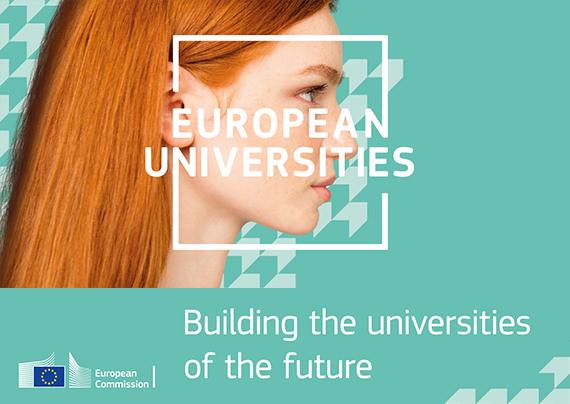
Η ευρωπαϊκή κοινωνία χρειάζεται σήμερα περισσότερο από ποτέ τη συμβολή των πανεπιστημίων και των άλλων ιδρυμάτων τριτοβάθμιας εκπαίδευσης. Η Ευρώπη αντιμετωπίζει σημαντικές προκλήσεις, όπως η κλιματική αλλαγή, ο ψηφιακός μετασχηματισμός και η γήρανση του πληθυσμού, σε μια εποχή κατά την οποία πλήττεται από τη μεγαλύτερη παγκόσμια κρίση του τελευταίου αιώνα στον τομέα της υγείας και από τις οικονομικές επιπτώσεις της εν λόγω κρίσης. Τα πανεπιστήμια, και ολόκληρος ο τομέας της τριτοβάθμιας εκπαίδευσης, κατέχουν εξέχουσα θέση στο σημείο τομής της εκπαίδευσης, της έρευνας και της καινοτομίας, στη διαμόρφωση βιώσιμων και ανθεκτικών οικονομιών, και σε μια Ευρωπαϊκή Ένωση πιο πράσινη, πιο συμπεριληπτική και πιο ψηφιακή.
Οι δύο νέες πρωτοβουλίες που εγκρίθηκαν σήμερα, μια ευρωπαϊκή στρατηγική για τα πανεπιστήμια και μια πρόταση της Επιτροπής για σύσταση του Συμβουλίου σχετικά με τη δημιουργία γεφυρών για μια αποτελεσματική ευρωπαϊκή συνεργασία στον τομέα της τριτοβάθμιας εκπαίδευσης, θα στηρίξουν τα πανεπιστήμια στην προσπάθεια αυτή.
Ο κ. Μαργαρίτης Σχοινάς, Αντιπρόεδρος για την Προώθηση του Ευρωπαϊκού Τρόπου Ζωής μας, δήλωσε: «Τα ευρωπαϊκά πανεπιστήμια αριστείας και συμμετοχικότητας αποτελούν τόσο προϋπόθεση όσο και θεμέλιο για τον ευρωπαϊκό τρόπο ζωής μας. Τέτοια πανεπιστήμια στηρίζουν τόσο τις ανοικτές, δημοκρατικές και δίκαιες κοινωνίες όσο και τη βιώσιμη ανάπτυξη, την επιχειρηματικότητα, την ένταξη και την απασχόληση. Με τις σημερινές προτάσεις μας επιδιώκουμε να ανεβάσουμε τη διακρατική συνεργασία στην τριτοβάθμια εκπαίδευση σε νέο επίπεδο. Με κοινές αξίες, μεγαλύτερη κινητικότητα, ευρύτερο πεδίο εφαρμογής και συνέργειες θα δώσουμε μια πραγματικά ευρωπαϊκή διάσταση στην τριτοβάθμια εκπαίδευσή μας.»
Η Επίτροπος Καινοτομίας, Έρευνας, Πολιτισμού, Εκπαίδευσης και Νεολαίας, κ. Μαρίγια Γκαμπριέλ, δήλωσε: «Οι σημερινές προτάσεις θα ωφελήσουν ολόκληρο τον τομέα της τριτοβάθμιας εκπαίδευσης και, πρωτίστως, τους φοιτητές μας, οι οποίοι χρειάζονται σύγχρονες διακρατικές πανεπιστημιουπόλεις με εύκολη πρόσβαση στην κινητικότητα στο εξωτερικό, ώστε να καταστεί δυνατή μια πραγματικά ευρωπαϊκή εκπαιδευτική πορεία και εμπειρία. Είμαστε έτοιμοι να ενώσουμε τις δυνάμεις μας με τα κράτη μέλη και τα ιδρύματα τριτοβάθμιας εκπαίδευσης σε ολόκληρη την Ευρώπη. Μαζί μπορούμε να φέρουμε πιο κοντά την εκπαίδευση, την έρευνα και την καινοτομία στην υπηρεσία της κοινωνίας. Οι συνασπισμοί ευρωπαϊκών πανεπιστημίων προετοιμάζουν το έδαφος· έως τα μέσα του 2024, ο ευρωπαϊκός προϋπολογισμός θα στηρίξει έως και 60 συνασπισμούς ευρωπαϊκών πανεπιστημίων με περισσότερα από 500 πανεπιστήμια σε ολόκληρη την Ευρώπη.»
Η ευρωπαϊκή στρατηγική για τα πανεπιστήμια
Η Ευρώπη φιλοξενεί περίπου 5.000 ιδρύματα τριτοβάθμιας εκπαίδευσης, 17,5 εκατομμύρια φοιτητές τριτοβάθμιας εκπαίδευσης, 1,35 εκατομμύρια διδάσκοντες τριτοβάθμιας εκπαίδευσης και 1,17 εκατομμύρια ερευνητές. Στόχος της στρατηγικής αυτής είναι να στηρίξει και να δώσει τη δυνατότητα σε όλα τα ευρωπαϊκά πανεπιστήμια να προσαρμοστούν στις μεταβαλλόμενες συνθήκες, να ευδοκιμήσουν και να συμβάλουν στην ανθεκτικότητα και την ανάκαμψη της Ευρώπης.
Προτείνει μια σειρά σημαντικών δράσεων για τη στήριξη των ευρωπαϊκών πανεπιστημίων στην επίτευξη τεσσάρων στόχων:
- ενίσχυση της ευρωπαϊκής διάστασης της τριτοβάθμιας εκπαίδευσης και της έρευνας,
- εδραίωση των πανεπιστημίων ως φάρων του ευρωπαϊκού τρόπου ζωής μας, με υποστηρικτικές δράσεις που εστιάζουν στην ακαδημαϊκή και ερευνητική σταδιοδρομία, στην ποιότητα και συνάφεια δεξιοτήτων διαχρονικής αξίας, στην πολυμορφία, στην ένταξη, στις δημοκρατικές πρακτικές, στα θεμελιώδη δικαιώματα και στις ακαδημαϊκές αξίες,
- ενδυνάμωση των πανεπιστημίων ως βασικών παραγόντων αλλαγής στη διττή —πράσινη και ψηφιακή— μετάβαση,
- ενίσχυση των πανεπιστημίων ως κινητήριων δυνάμεων του ηγετικού ρόλου της ΕΕ σε παγκόσμιο επίπεδο.
Δημιουργία γεφυρών για αποτελεσματική ευρωπαϊκή συνεργασία στον τομέα της τριτοβάθμιας εκπαίδευσης
Η πρόταση της Επιτροπής για σύσταση του Συμβουλίου έχει ως στόχο να δώσει τη δυνατότητα στα ευρωπαϊκά ιδρύματα τριτοβάθμιας εκπαίδευσης να συνεργαστούν στενότερα και πιο πολύπλευρα και να διευκολύνει την υλοποίηση κοινών διακρατικών εκπαιδευτικών προγραμμάτων και δραστηριοτήτων, τη συγκέντρωση ικανοτήτων και πόρων και τη χορήγηση κοινών πτυχίων. Πρόκειται για μια πρόσκληση προς τα κράτη μέλη να αναλάβουν δράση και να δημιουργήσουν κατάλληλες συνθήκες σε εθνικό επίπεδο προκειμένου να καταστεί δυνατή αυτή η στενότερη και βιώσιμη διακρατική συνεργασία και η αποτελεσματικότερη υλοποίηση κοινών εκπαιδευτικών και ερευνητικών δραστηριοτήτων, και προκειμένου να αξιοποιηθούν τα εργαλεία του Ευρωπαϊκού Χώρου Τριτοβάθμιας Εκπαίδευσης (Μπολόνια). Θα διευκολύνει τη ροή γνώσεων και θα δημιουργήσει ισχυρότερους δεσμούς μεταξύ των κοινοτήτων της εκπαίδευσης, της έρευνας και της βιομηχανικής καινοτομίας. Στόχος είναι κυρίως να υποστηριχθεί η παροχή ευκαιριών διά βίου μάθησης υψηλής ποιότητας για όλους, με έμφαση στις δεξιότητες και τις ικανότητες που χρειάζονται περισσότερο για την αντιμετώπιση των σημερινών οικονομικών και κοινωνικών απαιτήσεων.
Από τη θεωρία στην πράξη: τέσσερις εμβληματικές πρωτοβουλίες
Η ευρωπαϊκή διάσταση της τριτοβάθμιας εκπαίδευσης και της έρευνας θα ενισχυθεί με 4 εμβληματικές πρωτοβουλίες έως τα μέσα του 2024:
- Διεύρυνση σε 60 ευρωπαϊκά πανεπιστήμια με περισσότερα από 500 ιδρύματα τριτοβάθμιας εκπαίδευσης έως τα μέσα του 2024, με ενδεικτικό προϋπολογισμό Erasmus+ συνολικού ύψους 1,1 δισ. ευρώ για την περίοδο 2021-2027. Στόχος είναι η ανάπτυξη και αξιοποίηση κοινής μακροπρόθεσμης διαρθρωτικής, βιώσιμης και συστημικής συνεργασίας στους τομείς της εκπαίδευσης, της έρευνας και της καινοτομίας, με τη δημιουργία ευρωπαϊκών διαπανεπιστημιακών πανεπιστημιουπόλεων, όπου φοιτητές, προσωπικό και ερευνητές από όλα τα μέρη της Ευρώπης θα μπορούν να απολαμβάνουν ανεμπόδιστη κινητικότητα και να δημιουργούν από κοινού νέες γνώσεις σε διακρατικό και διεπιστημονικό επίπεδο.
- Επιδίωξη θέσπισης νομικού καθεστώτος για τους συνασπισμούς ιδρυμάτων τριτοβάθμιας εκπαίδευσης, ώστε να μπορούν να συγκεντρώνουν πόρους, ικανότητες και πλεονεκτήματα, με ένα πιλοτικό πρόγραμμα Erasmus+ από το 2022.
- Επιδίωξη δημιουργίας κοινού ευρωπαϊκού πτυχίου για την αναγνώριση της αξίας των διακρατικών εμπειριών στον τίτλο σπουδών τριτοβάθμιας εκπαίδευσης που λαμβάνουν οι φοιτητές και μείωση της γραφειοκρατίας για την υλοποίηση κοινών προγραμμάτων.
- Αναβάθμιση της πρωτοβουλίας για την ευρωπαϊκή φοιτητική ταυτότητα με χρήση ενός μοναδικού ευρωπαϊκού κωδικού αναγνώρισης φοιτητή, που θα προσφερθεί σε όλους τους μετακινούμενους φοιτητές το 2022 και σε όλους τους φοιτητές των ευρωπαϊκών πανεπιστημίων έως τα μέσα του 2024, ώστε να διευκολυνθεί η κινητικότητα σε όλα τα επίπεδα.
Επόμενα βήματα
Ο συντονισμός των προσπαθειών μεταξύ της ΕΕ, των κρατών μελών, των περιφερειών, της κοινωνίας των πολιτών και του τομέα της τριτοβάθμιας εκπαίδευσης είναι καίριας σημασίας για την υλοποίηση της ευρωπαϊκής στρατηγικής για τα πανεπιστήμια. Η Επιτροπή καλεί το Συμβούλιο, τα κράτη μέλη και τα πανεπιστήμια να συζητήσουν σχετικά με το εν λόγω θεματολόγιο πολιτικής και να εργαστούν από κοινού για πανεπιστήμια που θα είναι ανθεκτικά στις μελλοντικές εξελίξεις.
Η πρόταση της Επιτροπής για σύσταση του Συμβουλίου σχετικά με τη δημιουργία γεφυρών για αποτελεσματική ευρωπαϊκή συνεργασία στον τομέα της τριτοβάθμιας εκπαίδευσης θα συζητηθεί με τα κράτη μέλη. Αφού εγκριθεί από το Συμβούλιο η πρόταση αυτή, η Επιτροπή θα στηρίξει τα κράτη μέλη και τους σχετικούς εταίρους στην εφαρμογή της.
Ιστορικό
Η Επιτροπή κοινοποίησε την πρόθεσή της να δρομολογήσει τη συνδημιουργία ενός θεματολογίου μετασχηματισμού της τριτοβάθμιας εκπαίδευσης στην ανακοίνωσή της σχετικά με την υλοποίηση του Ευρωπαϊκού Χώρου Εκπαίδευσης έως το 2025 και στην ανακοίνωσή της για τον νέο Ευρωπαϊκό Χώρο Έρευνας. Στα συμπεράσματα του Συμβουλίου για τον νέο Ευρωπαϊκό Χώρο Έρευνας, που εγκρίθηκαν την 1η Δεκεμβρίου 2020, τονίζεται ότι «πρέπει να αναπτυχθούν ισχυρότερες συνέργειες και διασυνδέσεις μεταξύ του Ευρωπαϊκού Χώρου Έρευνας, του Ευρωπαϊκού Χώρου Τριτοβάθμιας Εκπαίδευσης και των στοιχείων του Ευρωπαϊκού Χώρου Εκπαίδευσης που σχετίζονται με την τριτοβάθμια εκπαίδευση». Στο ψήφισμά του της 26ης Φεβρουαρίου 2021 περί στρατηγικού πλαισίου για την ευρωπαϊκή συνεργασία στον τομέα της εκπαίδευσης και της κατάρτισης με στόχο τον Ευρωπαϊκό Χώρο Εκπαίδευσης και πέραν αυτού (2021-2030), το Συμβούλιο προσδιόρισε τη θέσπιση θεματολογίου για τον μετασχηματισμό της τριτοβάθμιας εκπαίδευσης ως συγκεκριμένη δράση στον τομέα προτεραιότητας της τριτοβάθμιας εκπαίδευσης.
Το θεματολόγιο πολιτικής για τον Ευρωπαϊκό Χώρο Έρευνας που προσαρτάται στα συμπεράσματα του Συμβουλίου σχετικά με τη μελλοντική διακυβέρνηση του Ευρωπαϊκού Χώρου Έρευνας, τα οποία εγκρίθηκαν στις 26 Νοεμβρίου 2021, στηρίζει δράσεις που αφορούν τα πανεπιστήμια, συμπεριλαμβανομένης ειδικής δράσης για την ενδυνάμωση των ιδρυμάτων τριτοβάθμιας εκπαίδευσης ώστε να αναπτυχθούν παράλληλα με τον Ευρωπαϊκό Χώρο Έρευνας και σε συνέργεια με τον Ευρωπαϊκό Χώρο Εκπαίδευσης.
Για περισσότερες πληροφορίες
Ανακοίνωση της Επιτροπής σχετικά με μια ευρωπαϊκή στρατηγική για τα πανεπιστήμια
Ανακοίνωση σχετικά με την υλοποίηση του Ευρωπαϊκού Χώρου Εκπαίδευσης έως το 2025
Ανακοίνωση της Επιτροπής με τίτλο «Ένας νέος ΕΧΕ για την έρευνα και την καινοτομία»
